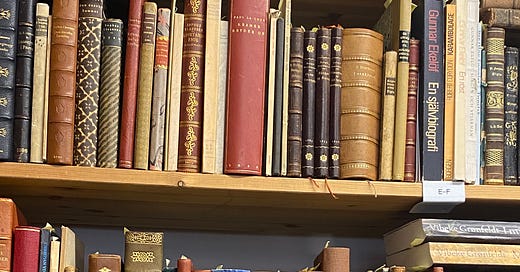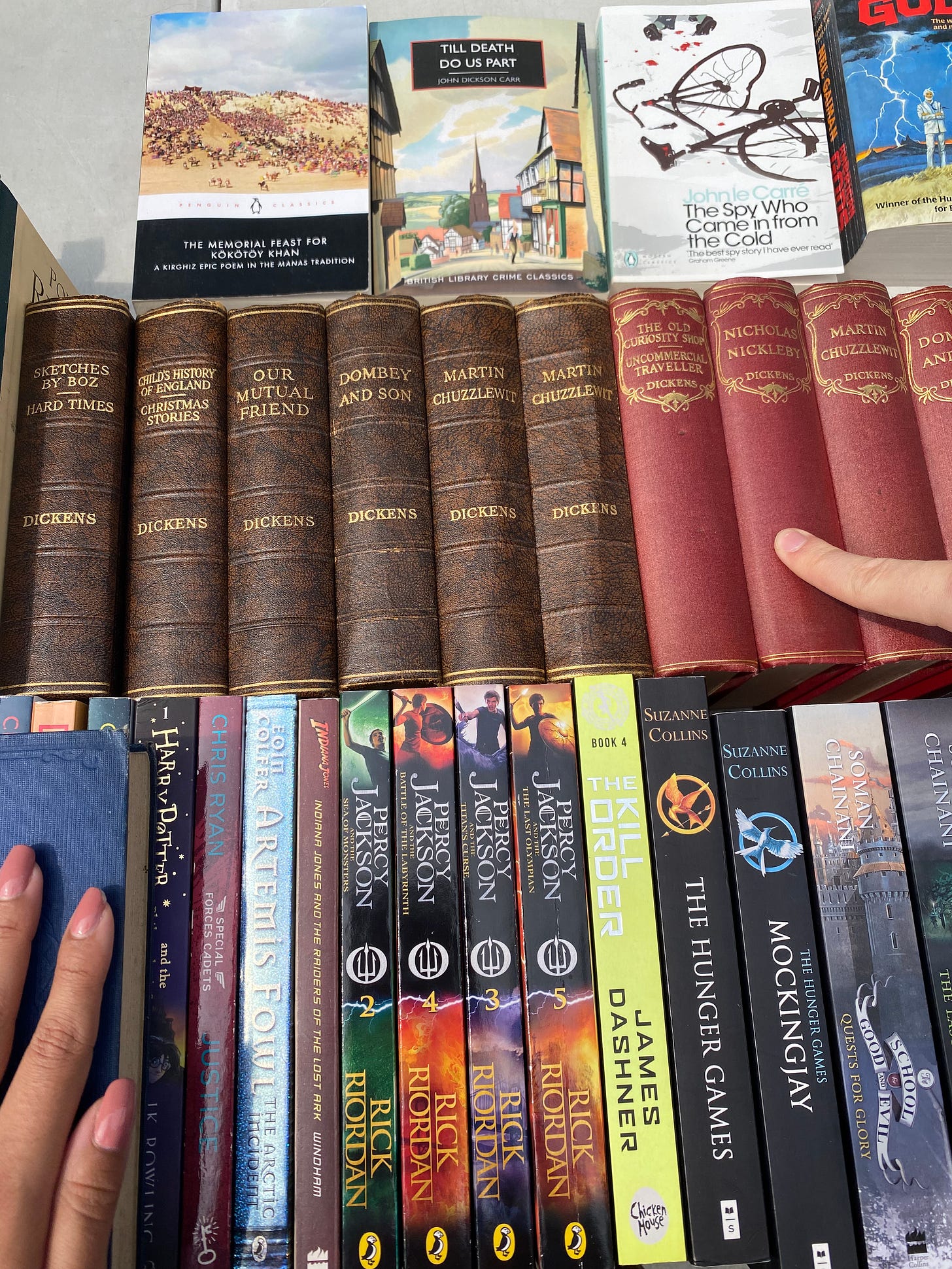Someone recently described me as ‘well read’. Actually not quite. They asked me if I had read Of Mice and Men, and when I said, no, they sat back in their chair, surprise written all over their face, and remarked “Oh, but I feel like you’re so well read.”
I had this interaction months ago, yet I still can’t stop thinking about it. Not in the way you might think, I’m not lying awake at night worried about whether people perceive me as being well read, I’m lying awake at night wondering what it even means to be well read—what it means to me to be well read.
If you look up the definition of “well read” you’ll get a lot of nominally different explanations.
“having read many books and therefore having gained a lot of knowledge”
“(of a person) knowledgeable and informed as a result of extensive reading.”
“well-informed or deeply versed through reading”
What I find interesting is not the definitions themselves, but in their examples of use, which are uniformly in the following format:
[name/pronoun] is well read in [specific topic]
By definition, being well read includes a specific scope, yet culturally we use the descriptor of being well read to encompass a much wider state of being, an overall identity.
So then what does it mean to be overarchingly, well read?
How much do you have to read to be well read? It is about sheer number of books or a specific few? Is there a mandatory reading list to be in the well read club? Do you have to read books, study books, both? Is it about just books, what about plays? Film scripts? Fiction, non fiction? And really, is it about reading or remembering?
Within certain circles, remembering, or rather memorisation, is a vital part of being well read, or engaging with literature as a whole. To be someone who can casually quote Aristotle, Dostoevsky, and Shakespeare. Very much a dark academia fantasy. Manic pixie lit girl.
There is a performance to it, the memorisation and regurgitation, but also there is a counterculture in memorising a poem, a passage, a quote. In a time where knowledge is more accessible than ever, carrying words in your head becomes doubly meaningful. Still this isn’t really what being well read is at all.
I would argue that being overarchingly well read has much to do with remembering, but little to do with memorisation.
“I cannot remember the books I've read any more than the meals I have eaten; even so, they have made me.”
This quote, famously misattributed to Ralph Waldo Emerson, is closer to how I think about what it means to be well read. Reading naturally expands your mind, therefore expanding your capacity for thought, which is at its core what being well read is about.
Being well read is about being able to take the words and translate them into knowledge. The books you have read become the framework through which you perceive and understand the world around you. It means not only to have read, but to have let the words into your heart, to let them alter you.
Being well read is in part, not about what you have already read, but your ability to understand the next thing you read. Being able to place something within its original context, understand it within and outside of said context, and, most essentially, add unique meaning or interpretation through the knowledge you have accrued from other reading.
Moving out of the ephemeral, questioning what it means to be well read means thinking about what exactly one has to read.
Being well read, especially as a common reader vs as an academic, means reading outside of a syllabus, without a tangible end goal to your reading. It means reading with the goal of learning as well as entertainment, but without the specified scope of academia. I think that many common readers could describe themselves as well read within the scope of their favoured genres, but wouldn’t be considered in the cultural definition of overarchingly well read. Someone with a swath of knowledge within a specific scope clearly has the ability to read well, and would surely bring something interesting to a text outside their wheelhouse, but may not be in and of themselves, well read.
Reading well is a skill that is essential to being well read, but they are not one in the same. Rocks and minerals.
Saying that I fall into a middle ground between the common reader and the academic reader feels like a bit of a stretch—an undergraduate degree in theatre and literature doesn’t feel like enough to call myself an academic. Nevertheless, as a result of having done that degree, I have read and studied texts like The Canterbury Tales, Robinson Crusoe, The Odyssey etc. While I do believe that the texts of the so-called “western cannon” hold value and add to my experience as a common and of course academic reader, I don’t feel like I have the answer to whether the common reader has to be reading texts like these in order to be well read.
There are texts that hold insurmountable literary and societal value, but it also feels impossible to say that being well read comes with a syllabus or really any mandatory reading material. Reading is a subjective and personal experience, and the literary world is simply too large to say that anything is essential reading for the common reader specifically. Too many books, too little time.
The cultural definition of being well read, is in some ways, so overarching that it becomes meaningless. It makes me wonder if being well read has to come within a specific scope or if the desire to be overarchingly well read is futile.
For example, my husband recently described Ernest Hemingway as the great American writer. I have never read a word of Hemingway. Nevertheless, through my surrounding literary knowledge, I can roughly place him within his time period and contemporaries. If I were to read Hemingway’s, A Farewell to Arms, tomorrow I would have a working understanding of the historical context and literary traditions within which the novel was published.
If you are someone who wants to be well read and has an ongoing desire to learn and read widely, you need to have an awareness of the blind spots in your knowledge and have some desire to fill them in. My aforementioned lack of experience reading Hemingway is in theory something I hope to cure eventually, but in reality when I think about the limited number of books I have the ability to read in my lifetime, there are some authors or books that I just know will never get read. Does this mean that for the common reader, the scope within which they can be well read is constrained by their own interests?
Yes and no.
I believe, that at its core, the desire to be well read, stems not from the desire to read a great deal, but to understand a great deal about the world around us. Therefore, an essential part of being well read, is having an ongoing sense of curiosity.
Said curiosity must result in reading widely, this doesn’t just mean reading across literary mediums, poetry, non-fiction, theatre, but specifically reading things that feel literarily essential or culturally significant, even when they don’t entirely call to you.
I am a lover of literature, but I also truly believe that sometimes reading a mediocre viral tiktok book can be just as illuminating as reading a Pulitzer prize winning novel or a classic. Sometimes a book’s value is not literary at all, but simply that a story’s widespread popularity has to say something about society as a whole. Sometimes a popular book’s value is in the conversations it spurs, often with people who do not consider themselves readers otherwise.
Part of what makes the common reader well read is their contact with the present. To understand the world and the people around us one must read bestsellers, genre fiction, and even popular booktok books, alongside Dickens or Ovid. Reading for escapism, entertainment, or morbid curiosity has its own value. In this way, I believe that the common reader is able to get a bit of a pass in not having read core literary texts, in exchange for being more in touch with the present.
Reading is escape, and the opposite of escape; it’s a way to make contact with reality after a day of making things up, and it’s a way of making contact with someone else’s imagination after a day that’s all too real. - Nora Ephron
I suppose all of this meandering leads me to two somewhat contradictory truths about what it means to be well read. Being overarchingly well read has to mean having an intrinsic curiosity, to make a conscious effort to read widely, to have the desire to understand literary tradition and society of the past as much as of the present. If present, that desire will naturally lead the common reader to certain essential or core literary texts. Simultaneously, by virtue of being a common reader, the scope of your reading is absolutely defined by your own interests. Specifically, defined, not constrained. Your own interests create the unique collection of knowledge that you bring to new texts and to the world around you.
“a jack of all trades is a master of none, but oftentimes better than a master of one”
The cultural use of well read may in fact be too wide to be tangible or definable, but the pursuit of being well read is still not futile. Being overarchingly well read is in reality, still subject to a specific scope, a scope that simply differs from reader to reader.
For me, having some distance now from my undergraduate degree (in Drama and English Literature), I find myself in a new landscape when it comes to being a reader and being a learner. I believe myself to be well read, but I want to stay well read. Anyway, thats a topic for next week where I will be having some thoughts about a personal syllabus for life.
if you made it this far, thank you for reading! i feel like this post was more word vomit than usual, but i had fun thinking about it so i wanted to put some thoughts out into the void that is substack.






